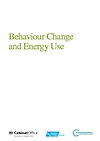Report: Behaviour Change and Energy Use
“This paper shows how government can make it easier for people to use energy more efficiently. It sets out a range of trials to test different ways of applying behavioural insights to overcome barriers to being more energy efficient. This research will help to ensure that government policy on energy efficiency will be as effective as possible in motivating behavioural change.
Chapter 1 sets out how we can encourage people to green their homes and be more energy efficient.
Chapter 2 focuses on how we can use information more effectively to encourage people to be more energy efficient. In particular, it explores how we can draw upon the fact that people are influenced by what those around them are doing (social norms), and are more likely to be influenced by information which is novel, accessible and of relevance to the individual in question.
Chapter 3 demonstrates how the Government has already done a great deal to achieve energy efficiency savings of its own. The Government set itself a target to reduce emissions from departments by 10% in just one year. The application of behavioural insights has helped the Government to surpass this objective, for example through changes to the default settings of heating and lighting systems. This chapter also recognises the work done by UK businesses, non-governmental organisations and other organisations, and sets out a new Responsibility Deal, whose aim is to encourage organisations to make public commitments to reduce energy use.Taken together, these trials and reforms show how the Government is drawing on new evidence to encourage positive behaviours in ways that do not require a new legislative initiative or spending programme. We will evaluate their impact, and ensure that lessons learnt inform future policy.”




